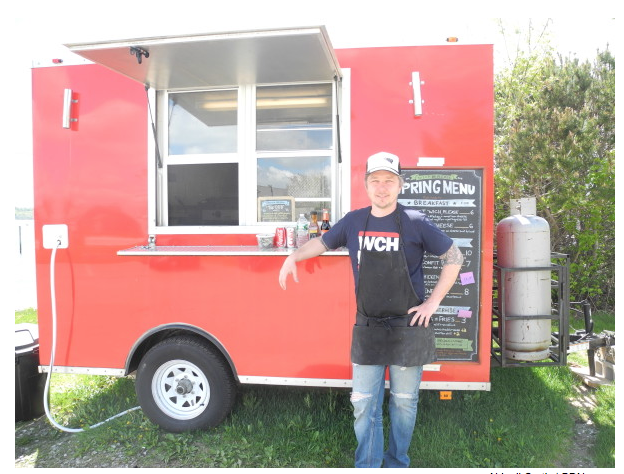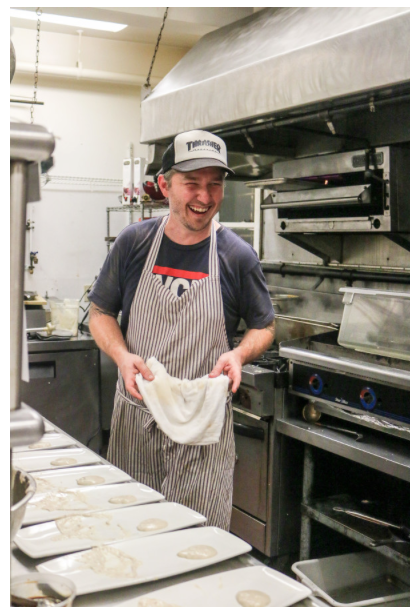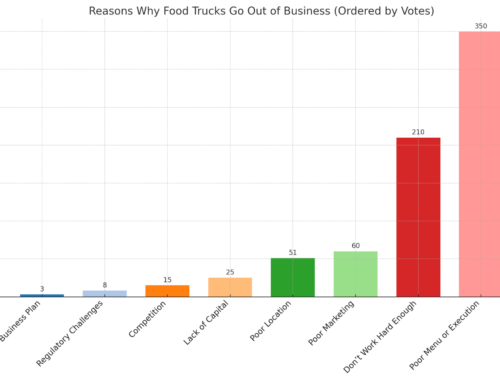
Malcolm Bedell of ‘Wich, Please in Rockland, Maine
One of the most frequently asked questions we receive on the topic of starting a food truck business is how many hours an average food truck owner must work per week to make a living. In this post, we want to help you estimate the hours per week an average food truck owner works in addition to giving you some context on what exactly operators are spending all their time doing. We recommend you make the time to read this article in detail before jumping into this business full-time!
According to Malcolm Bedell, owner of the ‘Wich, Please food truck in Rockland Maine–an average work week on his food trailer in during summer months is 60-hours per week. Of course the number of hours can vary greatly from week to week. Here’s why…
One reason for the variance is that a lot of food trucks generate spurts of income during special events where they will sell lots of food in a short period of time. One example from Bedell is when he vended at a lobster festival held annually in his city. Due to this multi-day event, he estimated a whopping 90-hour work week for that particular week. Obviously, operating a mobile food business at this frequency forever is impossible and not healthy.
One thing to keep in mind when operating a food truck as well is that for many this is a seasonal business. Using the example of Bedell again, he lives in a tourist town in Maine where there are long winters with small number of residents. During these months, ‘Wich, Please is closed. Allowing for a few months of rest and relaxation.
We pinged our good buddy Anthony Salvagno of Swich It Up food truck as well to provide his insights on the average number of hours worked each week. Salvagno’s estimated that on average he would put in between 50 – 70 hours on a “typical” week. As I’m sure you’re beginning to realize, working on a food trailer is not like punching in the clock at a 40 hour per week job.
Primary Factors That Determine the Number of Hours Worked Per Week
There are of course a ton of factors that go into the number of hours you can expect to work in any given week. It is also possible to only start a business part-time and this is recommended if you are just getting started. No need to quit your job right away and put all that risk and pressure on yourself. In fact, there are many successful food entrepreneurs that have used their weekends to build a food startup and waited 1 – 2 years to go full-time with the business. With all that being said, here are some of the biggest and sometimes hidden time sucks of this business model.
 Prep Time – Food trucks will often have the stigma of being easier to operate due to the limited amount of time they are open. For example, during a Monday – Friday week day, the food truck may only serve one lunch period the whole day and then be done. To the untrained eye that may seem like a breezy 3-hour work day assuming your open from 10:30 a.m. – 1:30 p.m. But that’s not the full picture.
Prep Time – Food trucks will often have the stigma of being easier to operate due to the limited amount of time they are open. For example, during a Monday – Friday week day, the food truck may only serve one lunch period the whole day and then be done. To the untrained eye that may seem like a breezy 3-hour work day assuming your open from 10:30 a.m. – 1:30 p.m. But that’s not the full picture.
Depending on the food that is being served, there could easily be two hours of prep time that need to be completed before rolling up on a profitable lunch spot. Think about the food concept you plan to have for your vehicle? Do you need to be doing chopping, adding spices, and slow cooking something extravagant? If so that’s going to take time to bring things together. Are you acquiring artisan breads from three different vendors? Well stuff like that will consume your day too. Finally, you’re going to need to commit time to cleaning up the truck after each service as well.
Administrative Time – This is one of the biggest time eaters that almost always goes overlooked. As a, hopefully successful food truck owner, your mobile phone is at your side at all times. Throughout your day you are handling calls and responding to emails from prospective customers that may be interested in booking you for a catering event, co-ordinating with food / beverage suppliers to make sure you’ve got enough hamburgers to feed a small army, and potentially even networking with other concession owners about potential joint ventures. Oh yeah, and if you have time after all that, maybe conduct a little social media work on the side.
Of course, the time and effort doesn’t end with customer service and marketing tasks, you’ve also got to record income, track costs, and handle the accounting the the company. As a solo business owner, you will need to wear many hats throughout the day.
Travel Time – Unlike a restaurant where you’re in the exact same location each day, a truck is mobile. This means that sometimes you’ll be driving anywhere from 15 minutes to a couple of hours to get to a vending location. Depending on whether or not you live in a big city, you could also get stuck in rush hour that will take even more time. Although travel is required and also a big advantage of owning a food truck, you need to be careful about accepting catering gigs or opportunities that are too far from your home base.
Unexpected Events – As in every day life, there will be unexpected events that throw you off course. Running a business is no different. There will eventually be an engine break downs that could shut you down for a few days. You or an employee might get sick. A vendor may not deliver those hot dog buns on time. As a small business owner, you need to be aware that bad stuff will happen and be ready to adapt quickly when needed and also be prepared for predictable bad events like when your truck won’t start. For example, have the number to your trusted repair man handy.
Market Demand – Here’s thing about operating a food truck, if you’re successful and people love your food, you will be a lot busier than other trucks. You’ll be called more often for catering events and festivals that happen in your town because promoters will know who you are. Generally, a busy in demand truck means you should be generating strong revenue for the business, but it can also leave you exhausted and seem like you’re working 24/7. As your truck grows in popularity, you will need to consider hiring on employees so you can worry less about the day-to-day operations of your business and focus more on booking more profitable events and building connections. At this time, you also might need to begin turning some of the less profitable business away.
In conclusion, you as the business owner will need to decide how much you want to work and what your personal goals are for the business. If you want to supplement an income, operating a couple lucrative events on weekends may be all you want to do. However, if you want to go full-time, in the early days expect to work at least 60 – 80 hours initially as a good rule of thumb. If you would like to learn more about the food truck business, check out this article where we explore the average cost of starting this type of business.





